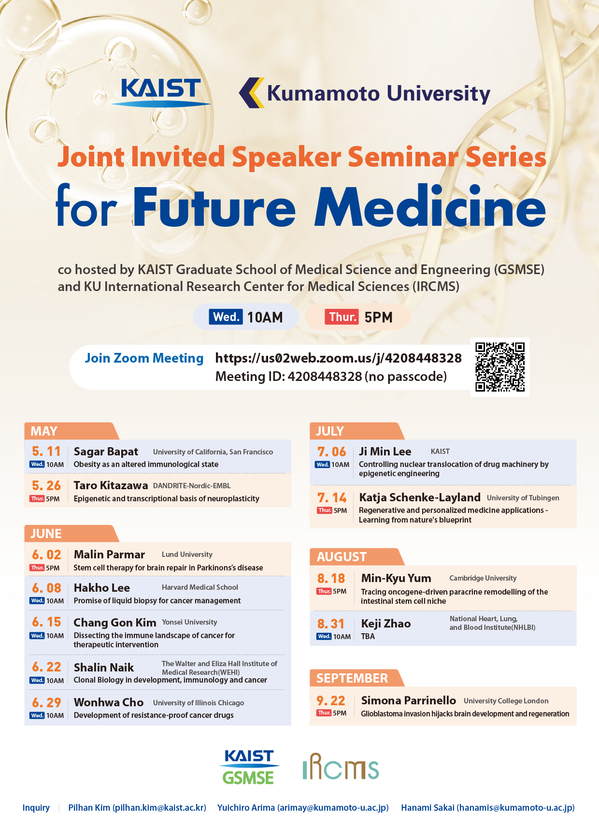- HOME
- News & Events
- [ May 26th ] Joint Invited Speaker Seminar Series for Future Medicine
News & Events
[ May 26th ] Joint Invited Speaker Seminar Series for Future Medicine
May 23 2022
The "Joint Invited Speaker Seminar Series for Future Medicine" will be co-hosted by Korea Advanced Institute of Science and Technology (KAIST) GSMSE and International Research Center for Medical Sciences (IRCMS). It will run from May 2022 to September 2022, with lecture given by scientists who are affiliated with IRCMS or in collaboration with reseachers at IRCMS. The lectures will be given three times a month, in English, and by leading scientists in the relevant research field.
Date : May 26th (Thu)
Time : 17:00 (JST)
Speaker : Dr. Taro Kitazawa
(DANDRITE-Nordic-EMBL, Denmark)
Title : Epigenetic and transcriptional basis of neuroplasticity
Abstract:
Appropriate transcriptional responses to environmental stimuli are fundamental for cellular development and maturation. How epigenetic chromatin states regulate neuronal activity-regulated transcription during development is poorly understood. To address this issue, we carried out epigenetic and transcriptional profiling of neuronal activity-response genes during mouse somatosensory neuron development. We found that in developing sensory neurons, prior to sensory activity-dependent induction, immediate early genes (IEGs, e.g. Fos) are embedded into a unique 'bipartite' Polycomb chromatin signature. Namely, IEGs carry active H3K27ac mark on promoters and enhancers, but repressive Polycomb-H3K27me3 mark on gene bodies. The bipartite chromatin signature originates from conventional Polycomb 'bivalent' chromatin, and can be appreciated in versatile developmental tissues including heart, liver, neural crest cells and mouse ESCs. Polycomb H3K27me3 marking of IEG gene bodies inhibits productive mRNA elongation, dampening basal productive transcription, while still allowing for fast stimulus-dependent mark removal and mRNA induction. We revealed a novel epigenetic chromatin mechanism regulating the rapidity and amplitude of the transcriptional response to relevant stimuli, while preventing inappropriate activation of IEGs at pre-sensory stages.
In addition, I want to introduce my new laboratory, opening in the DANDRITE-Nordic-EMBL in Denmark very soon. I will investigate epigenetic and transcriptional basis of memory engram plasticity, be taking advantage of the beyond state-of-the-art genomics technologies.
References:
1. Kitazawa, T., et al., Nature Genetics. 2021 Mar;53(3):379-391.
A unique bipartite Polycomb signature regulates stimulus-response transcription during development.
2. Kitazawa, T., et al., Curr Opin Neurobiol. 2018 Oct 17;53:210-219.
Barrelette map formation in the prenatal mouse brainstem.
Dr. Kitazawa's Lab: https://www.kitazawa-lab.com/
This seminar will be held via Zoom.
Please register at the link below if you would like to participate. https://docs.google.com/forms/d/e/1FAIpQLSenZyyWw2h4XA4GhJUwaoMbZb95CNstqAFWcWkHiN451rDwMg/viewform?usp=sf_link

